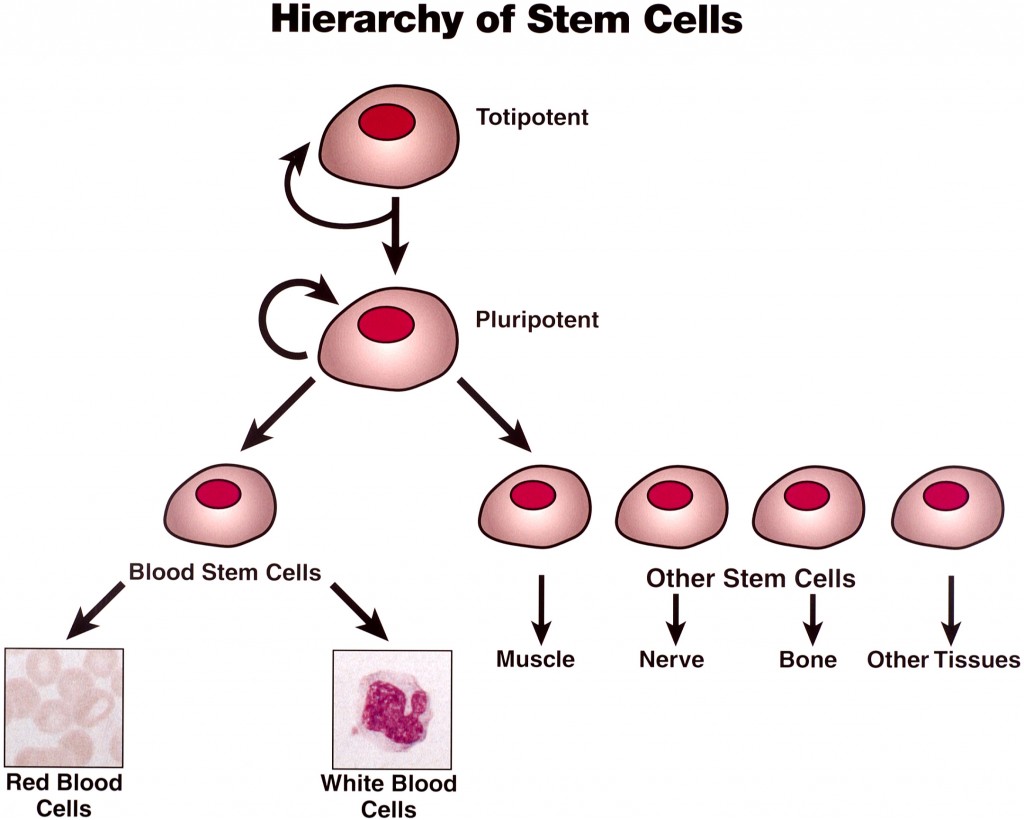Cloning, genetic engineering, and cures for cancer…stem cells seem to be capable of feats some might even call miraculous.
Stem cells are cells with the potential to develop into many different cell types in the body during their early life and growth. Unlike most cells in the body, stem cells are capable of renewing themselves through cell division, and they can sometimes even be induced to become tissue or organ-specific cells with particular purposes. This ability to become other types of cells and tissue has made it possible for doctors and scientists to develop cures for unnecessary and debilitating diseases.
Embryonic stem cells are developed from eggs which have undergone in-vitro fertilization, fertilization which occurs outside the body. Embryonic stem cells are pluripotent, which means they can be induced to become any other type of cell in the body. Quite literally, the possibilities with these cells are endless. The use of embryonic stem cell transplantation can cure diseases such as Parkinson’s, diabetes, traumatic spinal cord injury, Duchenne’s muscular dystrophy, heart disease, and vision and hearing loss.
Adult stem cells, on the other hand, are limited in their capabilities. They are undifferentiated cells, found among differentiated cells in a tissue or organ, which can renew themselves and differentiate to become some or all of the major specialized tissue or organ cells. Their restrictions have to do with the fact that, once adult stem cells are removed from the body, their ability to divide decreases. However, their list of potential functions, though significantly less than that of embryonic stem cells, includes important procedures as well. Cells derived from bone marrow stroma can help regenerate bone. Adult stem cells can produce insulin-producing cells to help cure type-1 diabetes, and cardiac muscle cells can help repair heart muscles damaged from a heart attack.
All in all, embryonic stem cells are the preferred method of regenerating cells by doctors, scientists, and geneticists because they can become all cell types of the body and are pluripotent while adult stem cells are much more restricted. Furthermore, because adult stem cells have a difficult time dividing once removed from the body, it is challenging for them to create cell cultures which are essential in cell replacement therapy. So, why not just use embryonic stem cells?
“There’s no reason why not; It’s genius,” said senior psychology major Sarah Croghan.
While many agree with this sentiment, the employment of embryonic stem cells has “…generated objections from fear, on ethical or religious grounds, that scientists are pressing too far into nature’s mysteries and the ability to create life artificially” according to the New York Times.
“Many right-wing republicans consider the harvesting of stem cells to be murder because those cells would potentially be a person if left to develop,” said sophomore communications major Lesley Donelan.
Some might say the issue is similar to that of whether or not people support a pro-life view of embryonic development.
“If the stem cells are taken from the placenta, how does that prevent life from forming? The organ leaves the body in after-birth and is generally thrown away – is that preventing future life?” said Croghan.
In addition, who has the right to decide whether an embryo or a teenager suffering leukemia should live more than the other?
“If you consider the amount of diseases that could be cured and the lives of those affected that could be saved as a result of stem cell research, I think the potential outcome is too great to give up on so easily because of one group’s religious beliefs,” said Donelan.
In addressing the perspective of scientists pressing too far into nature’s mysteries and the ability to create life artificially, many people express concerns that the use of embryonic stem cells damages cells of a living organism, that by using embryonic stem cells we are destroying potential life.
However, junior psychology major Kay Lanza said, “All cells hold life, not just embryos. We don’t get in trouble for scratching off dead skin cells.”
Whether or not embryonic stem cell use is ethical or not is a matter of personal opinion which requires deep consideration and profound awareness. Adult stem cells, after all, can do their part in curing diseases, but they are only capable of a fraction of the benefits and outcomes that embryonic stem cells can exhibit in numerous patients and circumstances. Umbilical cord stem cells can serve to replicate cells which might otherwise require a donor, which are consistently in short supply. Adult stem cells have experienced minimal success in treating multiple conditions. While it appears obvious that embryonic stem cells are the more convenient option, the stem of the conflict seems to be whether or not ethics will allow health to prosper.




